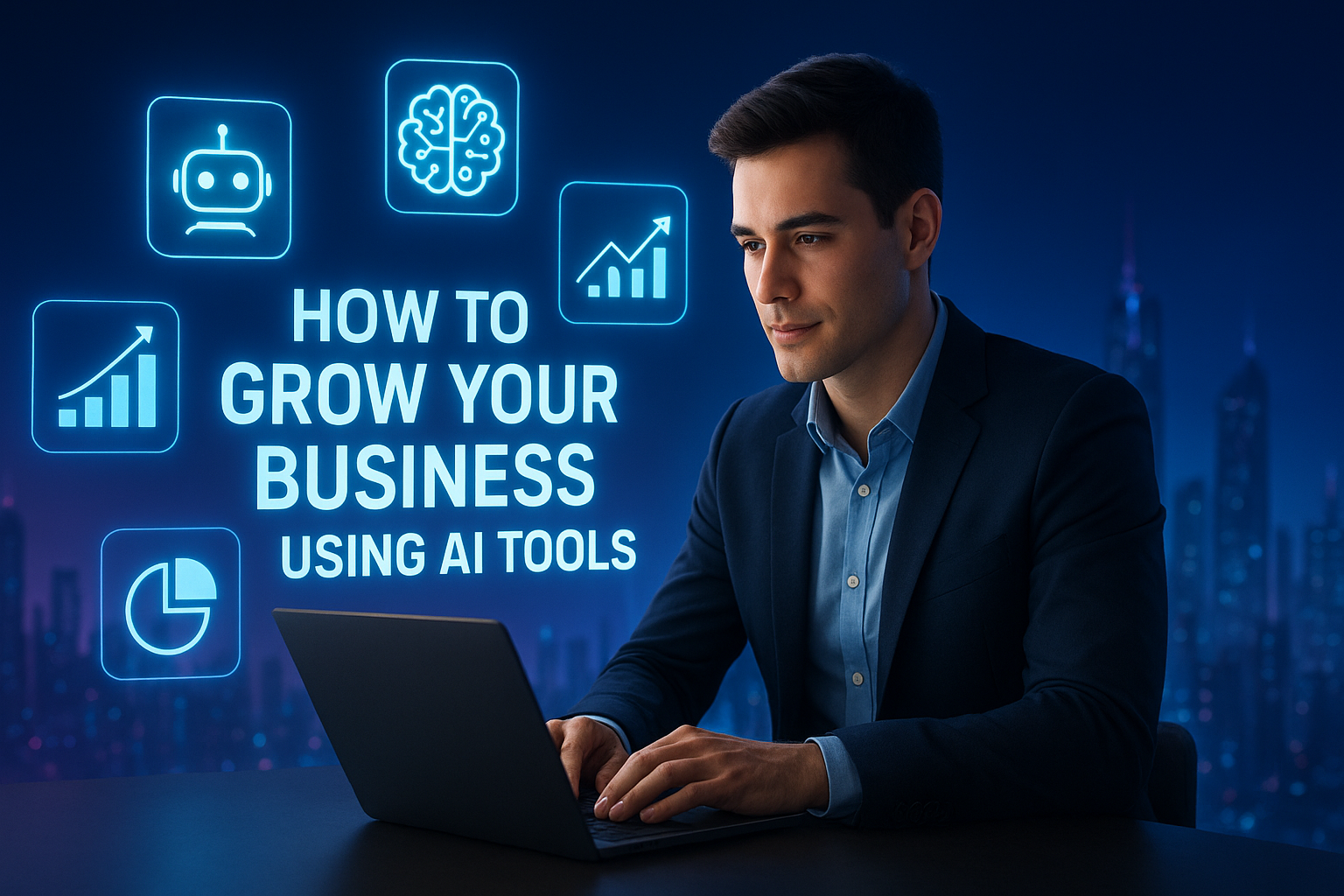Introduction
Artificial Intelligence (AI) has become one of the most powerful drivers of business growth in the modern world. What was once futuristic is now a daily necessity for entrepreneurs and companies striving for efficiency and innovation.
In 2025, AI tools are transforming how businesses operate—automating repetitive tasks, improving marketing accuracy, analyzing customer behavior, and enabling smarter decisions. Whether you’re running a startup or an established company, leveraging AI can give you a serious competitive edge.
This article explores practical ways to use AI tools to grow your business efficiently, increase profits, and enhance customer satisfaction.
1. AI for Marketing
Marketing has evolved far beyond guesswork. With AI, businesses can target the right audience, at the right time, with the right message—automatically.
AI-driven marketing tools use data analytics and machine learning to understand customer preferences and behavior. This allows businesses to create personalized campaigns that drive engagement and sales.
How AI improves marketing:
-
Personalized Advertising: Tools like Google Ads AI or Meta Advantage automate ad placements and optimize budgets based on performance.
-
Predictive Analytics: AI forecasts customer needs, helping you promote products they’re most likely to buy.
With AI, every marketing dollar is used more effectively, resulting in higher returns on investment and stronger brand visibility.
2. Chatbots and Virtual Assistants
Customer support is one of the most time-consuming aspects of running a business. AI chatbots and virtual assistants can handle repetitive queries instantly, saving both time and resources while maintaining 24/7 service availability.
Modern chatbots, powered by natural language processing (NLP), can answer FAQs, recommend products, and even process orders.
Benefits of AI chatbots:
-
Provide instant responses to customer inquiries.
-
Reduce workload for human support teams.
-
Gather valuable data about customer pain points.
When customers receive quick, accurate support, satisfaction increases—leading to better retention and loyalty.
3. Data Insights and Analytics
In today’s digital economy, data is one of the most valuable assets a business owns. However, raw data alone isn’t useful unless it’s interpreted effectively. That’s where AI analytics tools come in.
AI platforms like Google Analytics Intelligence, Tableau, or Power BI with AI integration help businesses analyze customer journeys, sales performance, and market trends.
Key advantages of AI analytics:
-
Detect hidden patterns in customer behavior.
-
Forecast demand and optimize inventory.
-
Identify weak spots in your marketing or operations.
Examples of AI analytics tools:
-
Zoho Analytics: Generates smart visual reports.
-
IBM Watson: Provides advanced predictive insights for large businesses.
By leveraging data intelligently, businesses can make evidence-based decisions that lead to consistent growth.
4. Automation Tools for Efficiency
One of AI’s biggest strengths lies in automation. It can handle repetitive tasks that consume valuable time, allowing you to focus on creativity, innovation, and strategy.
From email marketing to accounting, AI automation is reshaping daily operations for efficiency and cost savings.
Here’s how automation boosts growth:
-
Marketing Automation: Tools like HubSpot and Mailchimp send personalized campaigns automatically.
-
Finance Automation: QuickBooks and Xero use AI to track spending, generate invoices, and manage payroll.
By automating routine operations, businesses reduce errors, increase productivity, and save hours every week—creating room for strategic growth.
5. AI Design Assistants
Design plays a vital role in how customers perceive your brand. AI design tools make it easier for businesses to create professional visuals, logos, and content without hiring large creative teams.
AI-driven platforms like Canva Magic Design, Looka, and Adobe Firefly use algorithms to suggest layouts, color schemes, and content that match your brand identity.
Benefits of using AI design tools:
-
Save time and design costs.
-
Maintain brand consistency across marketing materials.
-
Create engaging content even without advanced design skills.
In 2025, visual appeal remains a key factor in building trust and driving conversions—and AI makes it simpler than ever to achieve that standard.
6. AI in Sales and Customer Relationship Management (CRM)
AI is revolutionizing how businesses manage customer relationships and sales pipelines. Tools like Salesforce Einstein, HubSpot AI, and Pipedrive now integrate machine learning to help teams prioritize leads and close deals faster.
How AI strengthens sales efforts:
-
Identifies high-potential leads through predictive scoring.
-
Suggests follow-up times and personalized messages.
-
Tracks interactions automatically to streamline communication.
This approach transforms CRM systems from simple databases into intelligent assistants that guide sales decisions based on real-time insights.
7. AI-Powered Content Creation
Creating consistent, high-quality content is essential for visibility and authority. AI tools like Jasper, Copy.ai, and Notion AI assist in writing blog posts, emails, ad copy, and social media captions tailored to your target audience.
However, the key is balance—AI can assist with ideas and drafts, but human oversight ensures authenticity and emotional impact.
Advantages of AI in content creation:
-
Accelerates writing and editing processes.
-
Enhances SEO optimization with keyword suggestions.
-
Maintains consistent tone and brand messaging.
Used wisely, AI content tools can multiply productivity without compromising creativity.
8. AI for Product Recommendations
E-commerce platforms are using AI to personalize the shopping experience. By analyzing user behavior, AI recommends products that customers are most likely to purchase—significantly boosting sales.
Amazon, Shopify, and Netflix have set global standards for this approach, showing how tailored experiences drive engagement and repeat purchases.
Benefits of AI recommendations:
-
Increases average order value.
-
Improves customer satisfaction with relevant suggestions.
-
Enhances user experience through personalization.
For any online business, AI-powered recommendations can turn casual visitors into loyal customers.
9. AI Security and Fraud Detection
With the rise of digital transactions, security is a growing concern. AI tools help detect unusual patterns, monitor transactions, and prevent fraudulent activity before it happens.
Examples include:
-
Darktrace — uses machine learning to detect cyber threats in real time.
-
Kount — analyzes user behavior to reduce payment fraud.
Businesses using AI-based security tools can protect customer trust while maintaining smooth and safe operations.
10. The Future of AI in Business Growth
As technology continues to evolve, AI will become an even greater part of everyday business management. Future innovations include voice-enabled business assistants, AI-driven financial forecasting, and predictive customer engagement tools.
Companies that embrace these changes early will be positioned ahead of their competitors. The goal is not to replace human intelligence but to enhance it—turning data and automation into strategic advantage.
Best Practices for Using AI Tools Effectively
Using AI tools successfully requires planning, integration, and ethical consideration.
Here are key practices to follow:
-
Start small with specific tools before scaling.
-
Train your team to use AI effectively.
-
Maintain transparency about AI use with customers.
-
Keep human creativity at the center of automation.
AI should simplify decision-making and save time—not replace genuine human connection or strategic thought.
Common Mistakes to Avoid
While AI can be incredibly powerful, misuse can lead to problems such as over-automation or dependency on software.
Avoid these mistakes:
-
Relying on AI without verifying data accuracy.
-
Ignoring privacy and ethical considerations.
-
Using too many tools without clear purpose.
Balance is crucial AI should enhance your processes, not complicate them.
Conclusion
Artificial Intelligence has redefined what’s possible for modern businesses. From marketing and customer service to design and data analysis, AI tools empower companies to work smarter, faster, and more efficiently.
In 2025, growth belongs to those who adapt quickly, experiment with technology, and combine automation with creativity. By integrating AI into your business strategy, you’re not just saving time—you’re shaping the future of how business is done.
Remember: AI doesn’t replace the human touch; it amplifies it. When technology and humanity work together, success follows naturally.


